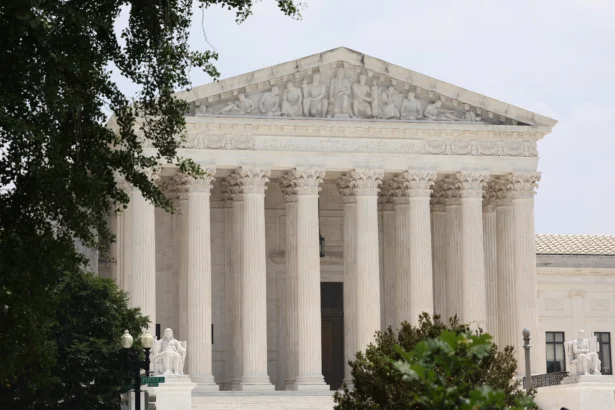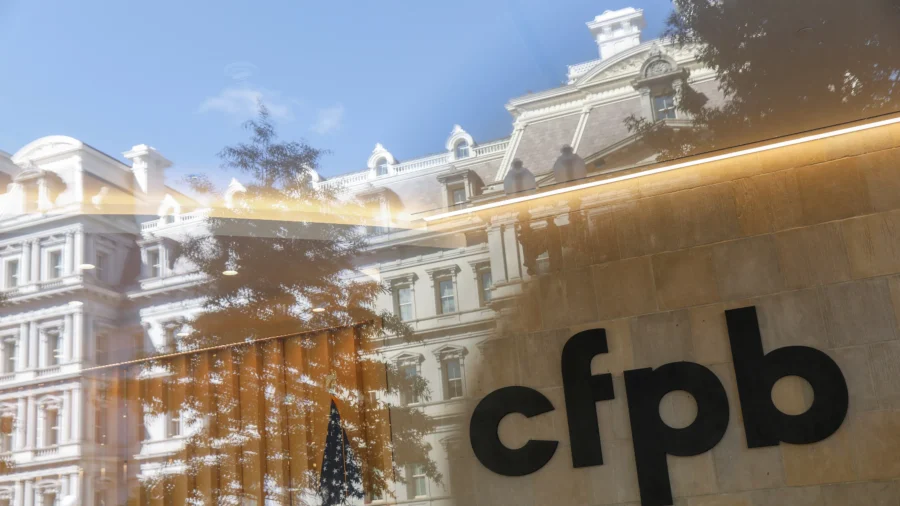Some in the financial services industry are nervous about how the Supreme Court will rule in a payday lending industry challenge to the constitutionality of the Consumer Financial Protection Bureau (CFPB) that is being heard this week.
A ruling against the powerful regulator in CFPB v. Community Financial Services Association of America (CSFA) (court file 22-448), which will be heard Oct. 3, could cause vast economic upheaval, an attorney representing big players in the financial sector said.
At the same time, another attorney rejected these apocalyptic warnings, saying that even if the court rules against the agency it probably wouldn’t prevent the CFPB from operating and would give Congress an opportunity to pass new legislation to fix any constitutional infirmities it may find.
The federal agency, which regulates consumer financial products such as credit cards, mortgages, and car loans, was the brainchild of Sen. Elizabeth Warren (D-Mass.). Democrats fiercely defend the CFPB, formed in the wake of the 2008 financial crash, saying it serves a useful function as a check on corporate power. Legislation creating it was enacted in 2011.
Republicans accuse the agency of overreach. The CFPB was targeted by the Trump administration, which disputed its constitutionality.
The CFSA, which represents payday lenders, sued over the CFPB’s rule that prevented lenders from trying to withdraw payments from borrowers’ bank accounts after two consecutive attempts failed because of insufficient funds.
A payday loan is a short-term loan, typically for a small amount such as $500 or less that is expected to be repaid with the borrower’s upcoming paycheck. The high-interest loans, which generally require proof of identity, income, and a bank account, appeal to borrowers with bad credit. The lender usually requires a signed check or permission to electronically withdraw money from the borrower’s bank account.
Unconstitutional
The U.S. Court of Appeals for the 5th Circuit ruled in favor of the CFSA, finding that the CFPB’s unusual funding mechanism was unconstitutional so it couldn’t make the rule.
That mechanism was created to keep the agency independent. Although it may seek funding from Congress, the agency is excluded from the normal congressional appropriations process, and instead receives most of the money it needs to operate from the Federal Reserve System, which collects fees from member banks.
But that independence is precisely what makes the funding system unconstitutional, the 5th Circuit determined. The mechanism violates the U.S. Constitution’s appropriations clause, which states, “No Money shall be drawn from the Treasury, but in Consequence of Appropriations made by Law.”
The clause “ensures Congress’s exclusive power over the federal purse,” which is needed to make sure that other branches of government don’t exceed their authority, the appeals court stated.
“Wherever the line between a constitutionally and unconstitutionally funded agency may be, this unprecedented arrangement crosses it,” the 5th Circuit stated.
Christian Adams, a former attorney at the Department of Justice, seemed surprised the Supreme Court was hearing the “super complicated” case at all.
“The Supreme Court seems to have settled this. It’s sort of peculiar why it is that the United States has dug in,” he said in an interview.
“I mean, the Supreme Court already has ruled that the whole agency is outside the checks and balances of the Constitution. So it’s hard to understand why we have to keep going back to the Supreme Court on that.”
Mr. Adams is also a sitting member of the U.S. Commission on Civil Rights and president of the Public Interest Legal Foundation.

Second Challenge in 3 Years
As he noted, this is the second challenge in three years to the constitutionality of the CFPB to reach the Supreme Court.
This appeal gives the court’s 6–3 conservative majority an opportunity to continue its campaign to restrain the so-called administrative state by curtailing the authority of regulators.
The Supreme Court issued a ruling in June 2020 altering the bureau’s structure but upholding its constitutionality.
In Seila Law LLC v. CFPB, the court held 5–4 that the structure of the CFPB was unconstitutional, because its director, who must be confirmed by the U.S. Senate, couldn’t be fired by the president at will and that the agency was therefore insulated from political accountability. The court held that the agency could continue to exist under new rules that allowed the president to fire the director at will.
In the Seila Law ruling, the court noted the existence of the controversial funding system but didn’t topple it, as some critics of the agency had hoped.
But the new case could have catastrophic consequences if the Supreme Court doesn’t tread carefully, an attorney representing powerful industry lobbies told The Epoch Times.
‘Walking in a Minefield’
Robert Loeb, a partner in the Washington office of Orrick, Herrington, and Sutcliffe, filed a friend-of-the-court brief (pdf) on behalf of the Mortgage Bankers Association, the National Association of Home Builders, and the National Association of Realtors.
The brief did not recommend a specific course of action to the court, but instead focused on making the justices “aware that how they rule in the case matters,” Mr. Loeb said in an interview.
“When you’re walking in a minefield, you should be cautious of where you’re stepping.
“And if you’re going to go big, you need to be careful on how you constrain the decision so it doesn’t have unintended effects.”
“A good chunk of our economy is based on the real estate business, mortgage business,” so any Supreme Court ruling in this case “could have severe repercussions for pretty much all of the American economy as a whole,” he said.
“Do they rule in a way that draws into question every CFPB regulation and suggests its invalidity is limited to this one regulation? Are they delaying their ruling in a way that gives Congress a chance to fix the funding while the current regulations are allowed to persist?”
If the court were to rule “in a very broad way which suggests the invalidity of everything the CFPB has done and all its regulations, it could have some very dramatic effects and the Supreme Court could accidentally walk into that.”
If the CFPB “goes down because its funding is bad, then that is going to put a cloud over everything, including mortgage regulations, which the whole industry and the mortgage economy relies upon,” Mr. Loeb said.
‘Tell Them Not to Worry’
Attorney Curt Levey, president of the Committee for Justice, a conservative legal advocacy nonprofit, had a different perspective.
“In general, corporate America doesn’t like a lot of regulation, but then they become used to and dependent on the regulation, and they’re, ‘oh, my God! If you took away the CFPB we’d have chaos,’ forgetting that, how long have we had a CFPB? Ten years or something?”
The world went on before the CFPB was created “and I’m sure would do fine without the CFPB now, but we’re not really talking about the CFPB going away, so tell them not to worry,” he said.
The worst the court “can do is basically say that it has to be funded by Congress instead of by the Federal Reserve, and I’m sure that would give Congress some time to make a statutory change.”
“Sometimes the court just declares, basically rewrites the statute.”
“So if I had to guess, I would guess that even if they were to say it was unconstitutional, they will just give Congress time to rewrite the statute, and I’m sure Congress would.”
“We will see what happens, but one way or another, the CFPB will survive,” Mr. Levey said.
From The Epoch Times

